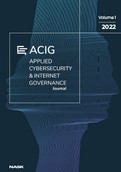The (Il)legitimacy of Cybersecurity. An Application of Just Securitization Theory to Cybersecurity based on the Principle of Subsidiarity
The (Il)legitimacy of Cybersecurity. An Application of Just Securitization Theory to Cybersecurity based on the Principle of Subsidiarity
Author(s): Johannes ThumfartSubject(s): Security and defense, ICT Information and Communications Technologies
Published by: NASK – Państwowy Instytut Wydawniczy
Keywords: cybersecurity dilemma; desecuritization; digital sovereignty; securitization; securitization theory; societal security dilemma;
Summary/Abstract: The application of securitization theory to cybersecurity is useful since it subjects the emotive rhetoric of threat construction to critical scrutiny. Floyd’s just securitization theory (JST) constitutes a mixture of securitization theory and just war theory. Unlike traditional securitization theory, it also addresses the normative question of when securitization is legitimate. In this contribution, I critically apply Floyd’s JST to cybersecurity and develop my own version of JST based on subsidiarity. Floyd’s JST follows a minimalistic and subsidiary approach by emphasizing that securitization is only legitimate if it has a reasonable chance of success in averting threats to the satisfaction of basic human needs. From this restrictive perspective, cyber-securitization is only legitimate if it serves to protect critical infrastructure. Whilst Floyd’s JST focuses exclusively on permissibility and needs instead of rights, I argue that there are cases in which states’ compliance with human rights obligations requires the guarantee of cybersecurity, most importantly regarding the human right to privacy. My version of JST is also based on the principle of subsidiarity, in the sense that securitization should always include stakeholders directly affected by a threat. To strengthen this kind of subsidiarity, focused on the private sector, I argue for the legitimacy of private active self-defence in cyberspace and emphasize the importance of a ‘whole-of-society approach’ involving digital literacy and everyday security practices. Moreover, I argue that far-reaching securitization on the nation-state-level should be avoided, particularly the hyper-securitization of the digital public sphere, following unclear notions of ‘digital sovereignty’.
Journal: Applied Cybersecurity & Internet Governance
- Issue Year: 1/2022
- Issue No: 1
- Page Range: 1-24
- Page Count: 24
- Language: English

